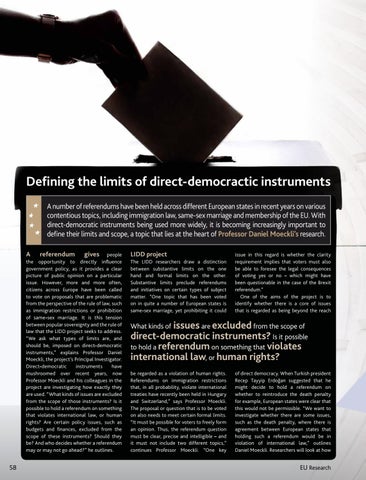Defining the limits of direct-democractic instruments A number of referendums have been held across different European states in recent years on various contentious topics, including immigration law, same-sex marriage and membership of the EU. With direct-democratic instruments being used more widely, it is becoming increasingly important to define their limits and scope, a topic that lies at the heart of Professor Daniel Moeckli’s research. A
referendum gives people the opportunity to directly influence government policy, as it provides a clear picture of public opinion on a particular issue. However, more and more often, citizens across Europe have been called to vote on proposals that are problematic from the perspective of the rule of law, such as immigration restrictions or prohibition of same-sex marriage. It is this tension between popular sovereignty and the rule of law that the LIDD project seeks to address. “We ask what types of limits are, and should be, imposed on direct-democratic instruments,” explains Professor Daniel Moeckli, the project’s Principal Investigator. Direct-democratic instruments have mushroomed over recent years, now Professor Moeckli and his colleagues in the project are investigating how exactly they are used. “What kinds of issues are excluded from the scope of those instruments? Is it possible to hold a referendum on something that violates international law, or human rights? Are certain policy issues, such as budgets and finances, excluded from the scope of these instruments? Should they be? And who decides whether a referendum may or may not go ahead?” he outlines. 58
LIDD project The LIDD researchers draw a distinction between substantive limits on the one hand and formal limits on the other. Substantive limits preclude referendums and initiatives on certain types of subject matter. “One topic that has been voted on in quite a number of European states is same-sex marriage, yet prohibiting it could
issue in this regard is whether the clarity requirement implies that voters must also be able to foresee the legal consequences of voting yes or no – which might have been questionable in the case of the Brexit referendum.” One of the aims of the project is to identify whether there is a core of issues that is regarded as being beyond the reach
issues are excluded from the scope of direct-democratic instruments? Is it possible to hold a referendum on something that violates international law, or human rights? What kinds of
be regarded as a violation of human rights. Referendums on immigration restrictions that, in all probability, violate international treaties have recently been held in Hungary and Switzerland,” says Professor Moeckli. The proposal or question that is to be voted on also needs to meet certain formal limits. “It must be possible for voters to freely form an opinion. Thus, the referendum question must be clear, precise and intelligible – and it must not include two different topics,” continues Professor Moeckli. “One key
of direct democracy. When Turkish president Recep Tayyip Erdoğan suggested that he might decide to hold a referendum on whether to reintroduce the death penalty for example, European states were clear that this would not be permissible. “We want to investigate whether there are some issues, such as the death penalty, where there is agreement between European states that holding such a referendum would be in violation of international law,” outlines Daniel Moeckli. Researchers will look at how
EU Research
